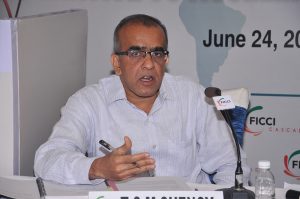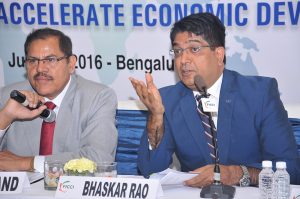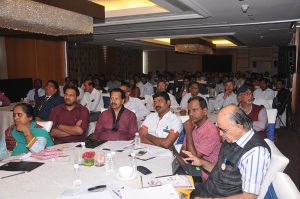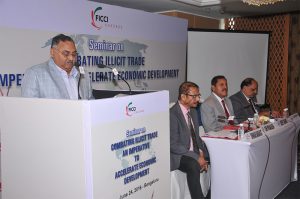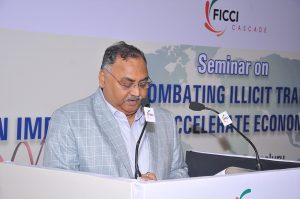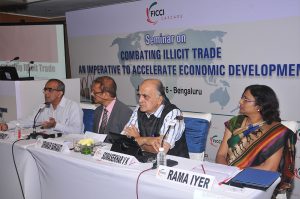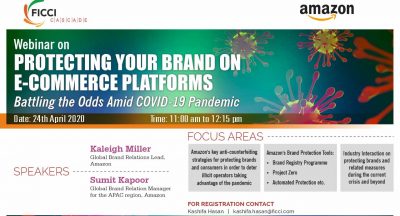24/6/2016 | Bangalore
FICCI CASCADE organized a seminar on ‘Combating Illicit Trade – An Imperative to Accelerate Economic Development’ on 24thJune, 2016 in Bangalore. The objective of the seminar was to focus on spreading awareness on the alarming magnitude of smuggling and other forms of illicit trade.The seminar discussed the role of stakeholders in increasing awareness on the subject and enforcement issues in addressing this menace. The event broughttogetherexperts from different domains to raise concern over the rapidly growing levels of illicit trade and its impact on the economy.
Shri Om Prakash, Director General of Police, Karnataka, was the chief guest at the event. During his address, he highlighted the following key elements which were required to curb smuggling activities in the country:
· Use of research and intelligence to better understand the extent of the problem
· Educational and awareness generation campaigns that raise public knowledge on the problem and its impact on society
· A policy regime that severely penalizes those involved in illicit trade
· Provision for human and financial resources devoted to enforcement to ensure that laws are properly enforced and criminals are brought to justice
· Using technology to distinguish between legal and illegal products
Mr. Tallam R. Dwarkanath, Member, FICCI National Executive Committee and President, Federation of Karnataka chambers of Commerce & Industry, welcomed the dignitaries and informed that FICCI had always been a torch bearer for the betterment of society and the country at large. Mr. Kamath addedthat the need of the hour wasfor all stakeholders to concertedly fight against such unlawful activities that were greatly harming the nation’s socio-cultural milieu. Steps such as greater vigil at the borders, better enforcement and consumer awareness campaigns are neededto eradicate the menace of growing illicit trade.
Mr. Deep Chand, Adviser, FICCI CASCADE & Former Special Commissioner of Police, New Delhi outlined the gravity of the problem that smuggling posed to the nation. He observed that illicit trade such as smuggling and counterfeiting not only creates a huge underground economy in which goods and services are traded illegally, but also funds criminal syndicates and terrorism that greatly endangers India’s national security. He informed that in 2012-2013, 35000 cases of smuggling& commercial fraud were recorded in India. The WCO Illicit Trade Report 2014 stated that in the excisable goods category, internationally tobacco products recorded the maximum cases of smuggling. Mr. Deep Chand also observed that smuggling striven to a large extent owing to high tax differentials that prevailed on products that are traded in neighboring areas. He also emphasized on the creation of a simplified tax regime along with awareness generation and stricter enforcement, which is important to address this issue.
The seminar also marked the enthusiastic participation of the panelists who deliberated on the need for consumer safety through increased awareness on the hazards of consuming smuggled and other illicit products. Mr. Somasekhar V K, Managing Trustee, Grahak Shakti,emphasized on the need to set up special courts to address economic offences as well as consumer concerns, and stressed on the strengthening of penal provision to instil fear among smugglers and counterfeiters.Ms. Rama Iyer, Advocate, Founder and Managing Partner, Ayana Legal,recommended that industry should keep a check on product price hikes,while the policy makers could look at levying reasonable tax rates to curtail trans-border movement of illegal products and deter the lucrative business of smuggling and manufacturing fake and illicit goods.
She also emphasized on the significant role that the media could play in spreading awareness on the issue and in enabling collaboration among st stakeholders to facilitate dialogue on the subject. Mr. T.S.M. Shenoy, General Manager, Finance, ITC Ltd,observed that consumers were the eventual victims of all forms of illicit trade, and they needed to be empowered to save themselves from the pitfalls of using illicit products. He added that making tax levels reasonable and consistent across regions would also greatly help in curbing smuggling activities in the country.
Senior officials from enforcement agencies deliberated on the subject of effective enforcement. Mr. D. Anil, Additional Chief Commissioner of Customs, Airport & ACC Commissionerate, Bengaluru, highlighted the role, that the customs department was playing in curbing smuggling and related activities. Presenting figures of seizure by his department, he informed that 75 lakh cigarette sticks worth Rs. 5 crore and smuggled gold of Rs. 30 crore were confiscated in Bangalore alone in the year 2014-2015. Mr. Bhaskar Rao, Additional Director General (Crime), Karnataka Police, emphasized that consumer and industry associations must strongly and repeatedly raise their voice on the issue of illicit trade to influence the government to take necessary steps in this regard. He stressed on the need to make the penal laws more stringent and take deterrent actions against smugglers. He also sought the support of all stakeholders, particularly the consumers, to help bring such illegal traders to the notice of the police department.
Mr. P. Anjani Kumar, Additional Director General, DRI, Bangalore Zonal Unit,while elaborating on India’s enforcement set-up and the various measures initiated to curb smuggling activities in the country, said that smuggling was a global problem, and India was no exception. He underlined the need for greater involvement of industry and consumers in registering complaints on illegal trade activities with the enforcement authorities. All the three panellists agreed that while illicit economic activities were damaging the country’s economic vitality, the nation’s security was also at stake as a result. The problem, therefore, needs to be discussed time and again, along with increased engagement with stakeholders and, most importantly, to generate awareness on the related ill effects.
The seminar witnessed vigorous interactions with delegates demonstrating an active interest in the problem. The event was attended by over 100 industry captains, representative from consumer forums, government officials and media associates.




